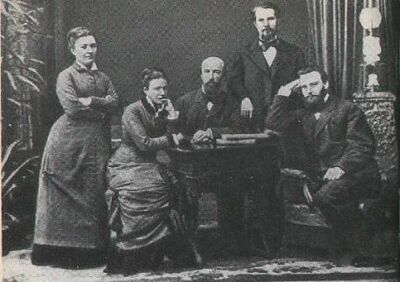Wilhelm Fitzenhagen and Varvara Maslova: Difference between pages
No edit summary |
|||
| Line 1: | Line 1: | ||
{{picture|file= | {{picture|file=Maslov Family.jpg|size=400px|caption='''Varvara Maslova''' (1839-1905), standing left in this photograph, which shows her together with (from left to right) sister [[Anna Maslova|Anna]], brother [[Fyodor Maslov|Fyodor]], the composer [[Sergey Taneyev]], and brother Nikolay Maslov}} | ||
Sister of Tchaikovsky's schoolfriend [[Fyodor Maslov]] (b. 1839; d. 1905), born '''''Varvara Ivanovna Maslova''''' (Варвара Ивановна Маслова). | |||
Varvara was the eldest of the five Maslov siblings. She read a lot and was proficient in German, English, and French. She was very keen on painting as well, and in her spare time she would decorate ceramics and do poker-work. At the age of 42, she decided to enrol in the [[ Moscow]] School of Painting, Sculpture, and Architecture, where she studied under [[Vladimir Makovsky]] and was in the same class as [[Lev Tolstoy]]'s daughter, Tatyana, who, despite being twenty-five years younger, became a close friend. | |||
During the summer months from 1880 to 1885 Varvara helped the composer [[Sergey Taneyev]], a regular guest at the Maslovs' estate Selishche, in Oryol province, to translate Ludwig Bussler's famous textbook on counterpoint from German into Russian. | |||
==Dedications== | |||
In 1893, Tchaikovsky dedicated his piano piece ''Impromptu'' — No. 1 of the [[Eighteen Pieces, Op. 72]] — to Varvara Maslova. | |||
==Correspondence with Tchaikovsky== | |||
2 letters from Tchaikovsky to Varvara Maslova have survived, dating from 1882 and 1891, and have both been translated into English on this website: | |||
* '''[[Letter 2074]]''' – 10/22 August 1882, from [[Moscow]] (addressed jointly to Varvara and [[Fyodor Maslov]], [[Anna Maslova]] and [[Sofya Maslova]]) | |||
* '''[[Letter 4560]]''' – 19 November/1 December 1891, from [[Maydanovo]] (addressed jointly to Varvara and her sisters [[Anna Maslova]] and [[Sofya Maslova]]) | |||
2 letters from Varvara Maslova to Tchaikovsky, dating from 1882 and 1887, are preserved in the {{RUS-KLč}} at [[Klin]]. | |||
==Bibliography== | ==Bibliography== | ||
* | * Tamara Slutskaya, "«Очень хочется в Селище...» (Танеев и семья Масловых)" in E. V. Fetisova (ed.), ''Новое о Танееве'' ([[Moscow]], 2007), p. 57–69 | ||
[[Category:People| | [[Category:People|Maslova, Varvara]] | ||
[[Category: | [[Category:Correspondents|Maslova, Varvara]] | ||
Revision as of 09:48, 8 August 2023

Sister of Tchaikovsky's schoolfriend Fyodor Maslov (b. 1839; d. 1905), born Varvara Ivanovna Maslova (Варвара Ивановна Маслова).
Varvara was the eldest of the five Maslov siblings. She read a lot and was proficient in German, English, and French. She was very keen on painting as well, and in her spare time she would decorate ceramics and do poker-work. At the age of 42, she decided to enrol in the Moscow School of Painting, Sculpture, and Architecture, where she studied under Vladimir Makovsky and was in the same class as Lev Tolstoy's daughter, Tatyana, who, despite being twenty-five years younger, became a close friend.
During the summer months from 1880 to 1885 Varvara helped the composer Sergey Taneyev, a regular guest at the Maslovs' estate Selishche, in Oryol province, to translate Ludwig Bussler's famous textbook on counterpoint from German into Russian.
Dedications
In 1893, Tchaikovsky dedicated his piano piece Impromptu — No. 1 of the Eighteen Pieces, Op. 72 — to Varvara Maslova.
Correspondence with Tchaikovsky
2 letters from Tchaikovsky to Varvara Maslova have survived, dating from 1882 and 1891, and have both been translated into English on this website:
- Letter 2074 – 10/22 August 1882, from Moscow (addressed jointly to Varvara and Fyodor Maslov, Anna Maslova and Sofya Maslova)
- Letter 4560 – 19 November/1 December 1891, from Maydanovo (addressed jointly to Varvara and her sisters Anna Maslova and Sofya Maslova)
2 letters from Varvara Maslova to Tchaikovsky, dating from 1882 and 1887, are preserved in the Tchaikovsky State Memorial Musical Museum-Reserve at Klin.
Bibliography
- Tamara Slutskaya, "«Очень хочется в Селище...» (Танеев и семья Масловых)" in E. V. Fetisova (ed.), Новое о Танееве (Moscow, 2007), p. 57–69
